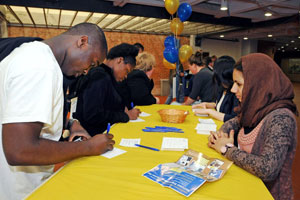Alumni Profile - Dr. Wendell Johnson

January 2015
It’s not uncommon that many of our students wind up transferring to a four year institution and eventually continue on working towards post graduate degrees. One such alumnus, Dr. Wendell Johnson CRAL '80, transferred twice after studying at the College and eventually earned his Ph.D. from one of the top programs in the United States. As a new year resolution, Dr. Johnson hopes to transfer his coursework back to the College and receive his degree after more than three decades. This story highlights the significant work of all our graduates thanks to the start they got here at Delaware County Community College.
What year did you graduate from Delaware County Community College and with what degree?
“I attended the College from 1978-1980, and needed six credits to complete the associate degree program. It has taken over 30 years, but my goal for the new year is to transfer the six credits back to the College in the hopes of receiving my formal degree.”
Did you pursue further academic goals?
“After my time at the College, I attended Temple University for one year, and then transferred to Cheyney University, where I received a BA in sociology in spring 1983. I entered the Ph.D. program in Sociology at Northwestern University in fall 1983. Northwestern had, at the time, and still has today, one of the top 10 sociology graduate programs in the country. I received my master’s degree in sociology in 1984 and my Ph.D. in sociology in 1994.”
Where are you now?
“I am currently Assistant Professor of Sociology at Shippensburg University. I have had academic appointments at the University of Illinois Chicago School of Public Health, Emory University School of Medicine, Clayton State University, and the University of Texas-San Antonio. I also taught as an adjunct at Georgia Perimeter College, the largest two-year college in Georgia.”
What is next for you professionally?
“In the past 25 years I have conducted social-behavioral research on HIV/AIDS and illicit drug use, taught courses on sociology and criminology, and advised students. I have been published in major peer reviewed journals, including Journal of Acquired Immune Deficiency Syndromes, Journal of Ethnicity and Substance Abuse, Justice Quarterly, American Journal of Public Health, and Crime and Delinquency. Next, I would like to focus on writing a book on some of my research experiences.”
What is your favorite memory of your time on campus, outside the classroom?
“When I was a student at the College, I helped to form the Black Student Association and was president of the group. As a student organization, we took several educational trips to the United Nations in New York and to the United States Capital in Washington, D.C. This was the first time I had been to either city, and had a great time.”
Did you have a favorite professor or class during your studies?
“All of my professors were excellent, but perhaps the most memorable was Sam Finkelstein, who taught American Government. I learned a lot about American Government, but the most important lesson I learned from Mr. Finkelstein was being prepared for each class. Mr. Finkelstein had no tolerance for students who did not come to class prepared to discuss course material. When you were called on in class to answer a question, you had to be ready with a response to demonstrate your grasp of the material and that you had read and understood the required text readings. I believe his teaching philosophy centered on active student engagement and his teaching style demanded that students be prepared for class. It was probably best just not to come to class, rather to come to class unprepared. I observed an older student once brake down into tears, as she was unprepared for class and unable to answer Mr. Finkelstein’s questions. Mr. Finkelstein was passionate in his teaching, and his demanding style taught me how to study and be prepared for each class. In my own classes today, I tell my students about Mr. Finkelstein and the importance of preparation. I have modeled my own teaching style and classroom expectations from his example.”
What advice would you give to current students and alumni to capitalize on the education they received from the college?
“Delaware County Community College provides an excellent, quality educational foundation, and students who graduate from here are well prepared for success at four-year and graduate programs. In my first semester as a professor at Shippensburg, I had a student who attended the College, and he earned an ‘A’ in the course. He was also an athlete, and was always prepared for my class. Be confident, would be my advice, that the education you received has prepared you to achieve your goals.”













